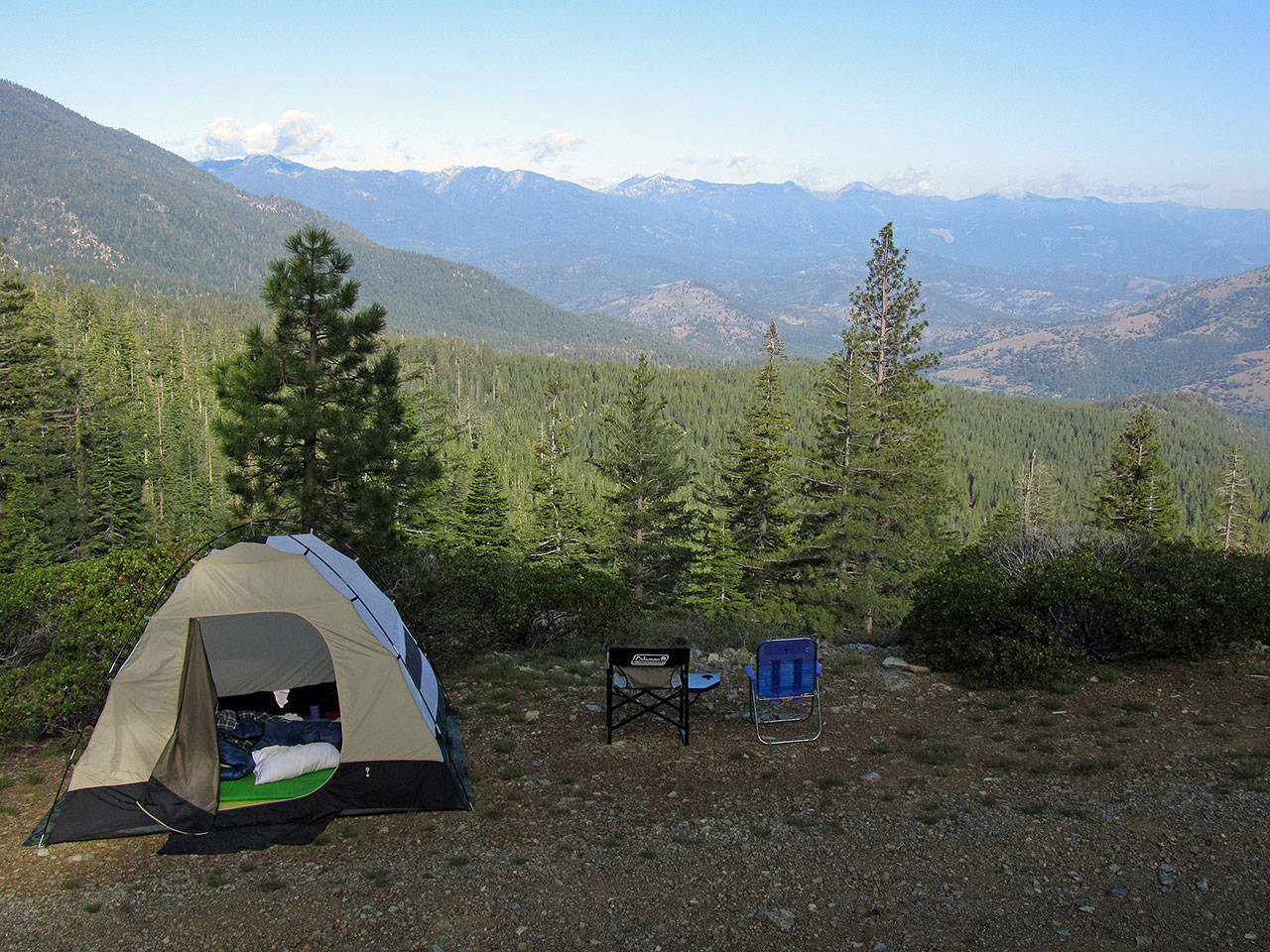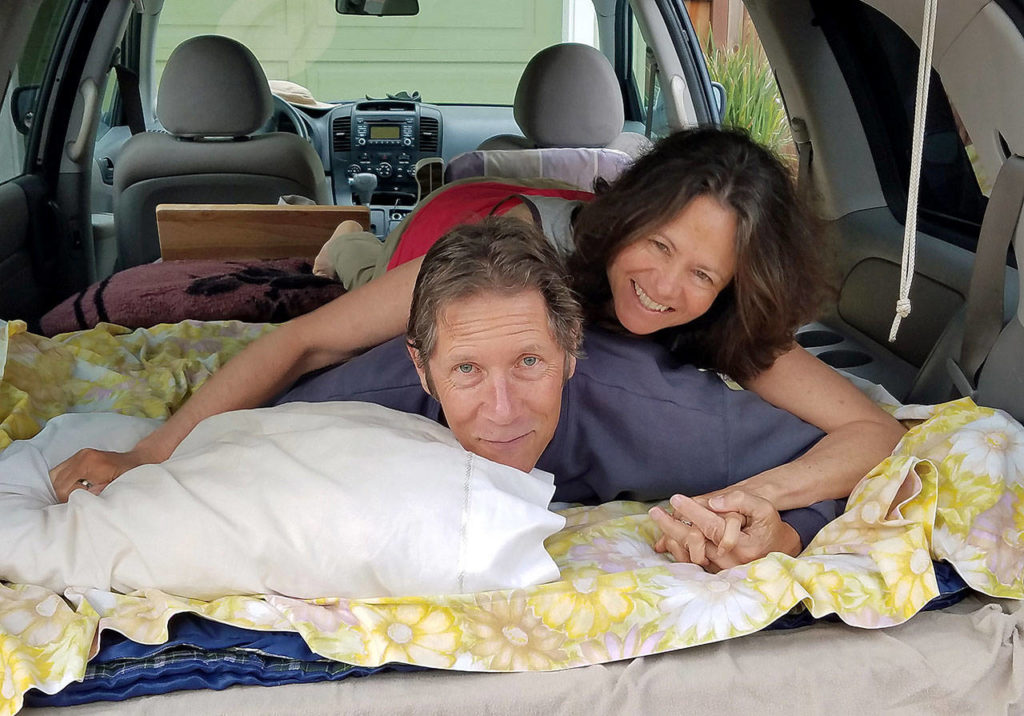By Jessi Loerch / Washington Trails Association
Camping is one of the great joys of summer for many folks in Washington. That’s even truer than usual this year, when so many of us are heading outside for both our physical and mental health. That all means it can be hard to find a campsite — and hard to find a spot that makes social distancing easy.
Dispersed camping — also known as free camping or boondocking — is one way to spend time in nature while avoiding more crowded areas. Dispersed camping is allowed in many areas across the state — but not all. For instance, most national parks do not allow it. Check with the land manager to ensure dispersed camping is allowed where you plan to go.
John Soares, a guidebook author and avid hiker, has written a guide to just this sort of camping. His new book, “Camp for Free: Dispersed Camping & Boondocking on America’s Public Lands,” offers advice on all aspects of dispersed camping, including where you can camp, how to find good campsites, how to be a responsible steward of public lands and how to stay safe.
Soares started dispersed camping more than 30 years ago while writing hiking guidebooks. He found it made it easier for him to access more remote hikes.
The Washington Trails Association talked with Soares recently about his latest book and dispersed camping.
Why is this book important right now?
Because of the pandemic we are, of course, supposed to be social distancing. And dispersed camping is a great way to do distancing — by definition, you are in the wild with just you and your companions. You don’t have to be concerned by other folks being around.
Also, right now we need to promote our physical and mental health. Dispersed camping is great for both of those. The pandemic is putting mental stress on us. Physically being outside, moving around, hiking, swimming and things like that are all good for our mental health. And you can simply recharge your batteries while outside, you can calm down and get perspective of what’s important in life.
It’s just a way to really get into nature and relax and calm down. It also allows us to put our highly civilized lives on hold and just get out in to nature — away from phones and the news — and it allows you to relax and get in touch with your body and really feel what it’s like to be outdoors.
What are some tips for folks who want to try dispersed camping?
You have to make sure you are very well-prepared. You need to be ready for anything. Your vehicle should be in good running order, and you should be prepared with a spare tire and a repair kit. You also have to make sure you have all the food and water that you need — as well as all the other supplies you need. There might not be a store anywhere around — and right now it’s best to limit your exposure to rural communities.
And as well as being prepared with supplies, you’ll also want choose carefully where you go. You want to be relatively certain you will be able to find sites that are accessible to your vehicle. Using a high-clearance vehicle is nice, because you’ll be able to manage most roads. However, even with lower clearance or more compact sized cars, you can still find areas to camp.
Research in advance to make sure you’re going somewhere camping is allowed. Also make sure there aren’t any burn bans in place if you plan to have a campfire. Check the weather before you go.
Also, right now, it’s a good idea to try to stay local — what counts as local will vary depending upon where you live. I’ve been staying within about two hours of home. Staying local means that you minimize the need to go into stores or businesses or require medical care in smaller towns that are not well equipped to deal with COVID-19 cases. Of course, I know that’s a double-edged sword, because many of these businesses rely on tourism. It’s a hard question right now.
Any special recommendations for Washington residents?
Just like anywhere else, people should be sure to follow the key tips. Just really make sure you pay attention to anything that could cause you problems. And remember a lot of the state is wild and remote — make sure you are truly prepared. Check the weather, make sure you are aware of fires in the area and whether there are burn bans.
Dispersed camping best practices
See Soares’ book, which these tips come from, and the WTA’s Leave No Trace information for more details on responsible camping.
Camp and walk on durable surfaces. Don’t create new camps or drive or camp on sensitive areas such as meadows or the edges of river or lakes.
Pack it out — all of it. Bring out everything you bring with you, including items such as apple cores and orange peels. Bring a few trash bags so you can also pack out other trash if you find it.
Skip campfires. John explains nine solid reasons for skipping the campfire in his book, including practical (it takes work, the smoke can be annoying, it’s a hard way to cook) and safety reasons (it’s all too easy to accidentally set a wildfire, especially in the heat of summer).
Won’t skip a campfire? Make sure they’re allowed. (Note: Campfires are banned right now in many areas across the state, including in some established campgrounds. Verify the rules before you go and brush up on your fire safety.) Use an existing campfire ring; use only dead wood, particularly small pieces; don’t burn trash; never leave a fire unattended; don’t burn in windy conditions; and ensure you have plenty of water available, and when you’re done, drown the fire. There should be no heat at all from the pit.
What to do without a toilet. Unless your vehicle has a toilet, you’ll need to be prepared to deal with no established restrooms. For poop, dig a cathole at least 6 inches deep, at least 200 feet from water. Pack out your toilet paper. And consider packing out your poop, especially if in a very dry area or where you can’t dig a hole. Pee far from water and not always in the same place. Pack out all toilet paper.
Stay clean and wash dishes. If you have to use soap, use biodegradable soap and make sure to disperse it in as wide an area as possible, far from a water source. Keep food particles off the ground.
Respect wildlife. Give wildlife plenty of space to go about their daily lives without having to alter their behavior due to your presence. If you have a dog, keeping them leashed will limit their effect on wildlife.
Respect plants and rocks. Minimize your disturbance of the environment by leaving plants and rocks in place.
Be a good neighbor. If other people are around, do what you reasonably can to allow them to have a good camping experience. Give them space, be careful about your noise level and be aware of how your lights can affect other’s ability to enjoy the dark and the night sky.
Washington Trails Association promotes hiking as a way to inspire a people to protect Washington’s natural places. Get inspired to go hiking and learn how you can help protect trails at www.wta.org.
Tips for dispersed camping during the pandemic
Dispersed camping is an excellent way to enjoy the outdoors while practicing social distancing. The main goal is to minimize the need to use services in the areas you visit so that you don’t get close to other people.
Stay local. Pick areas that are relatively close to where you live.
Plan ahead. Have a good idea of where you can find good dispersed campsites that are easily accessible by your vehicle. (Check with the land manager before you head out. Dispersed camping is not allowed in most national parks, including in Washington.)
Be smart when packing. Take all of your own food, water and supplies so you won’t need to visit stores. And remember, pack out everything you bring with you. Dispersed sites won’t have trash service available.
Check your vehicle. Make sure it’s in excellent condition so you minimize the possibility that it will break down.
Check the weather. Be sure you’re prepared for it.
Source: John Soares
Talk to us
> Give us your news tips.
> Send us a letter to the editor.
> More Herald contact information.


























